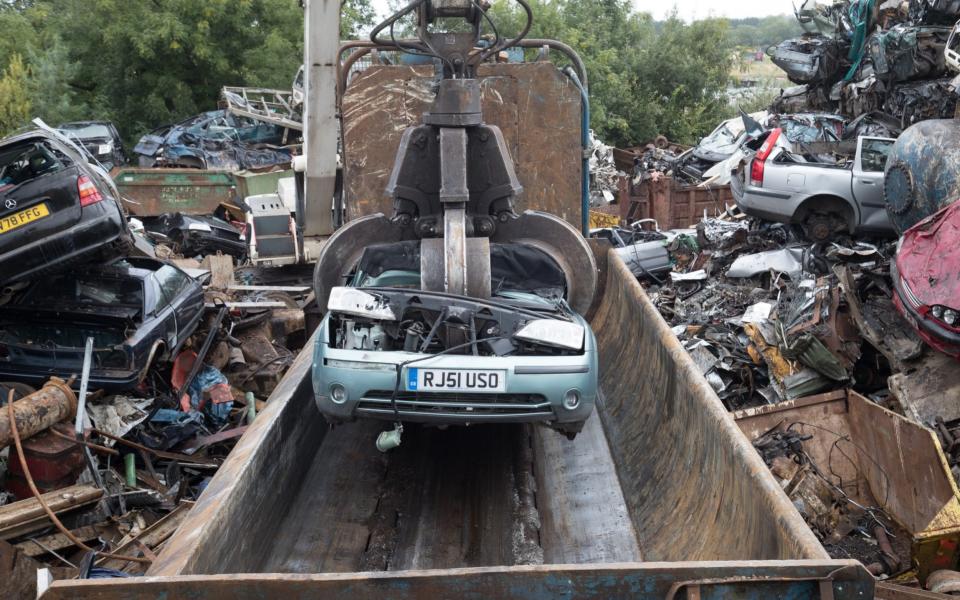Honest John: A guide to avoiding the theft of your car’s catalytic converter

Older hybrid cars are sitting on a fortune. Values of platinum, palladium and rhodium used in their catalytic converters that reduce toxic gases and pollutants in the exhaust gases are at an all-time high; rhodium in particular tripled in value since March 2020 and is now worth far more than gold.
These durable precious metals are not seriously corroded or degraded by emissions from the Atkinson-cycle petrol engines typically used to power hybrids in tandem with a lithium-ion drive battery.
Consequently, hybrid “cats” are now worth an average of £400 apiece, which is why 14,500 were hacked off older hybrid cars last year in London alone. Older Honda Jazz and CR-V non-hybrids have also been targeted.
Owners of newer hybrid cars (those less than five years old) have much less to worry about. Developments in catalytic converter technology reduced the need for precious metals. Also, in many newer hybrids, the catalytic converters are situated closer to the exhaust manifolds where they are not only more effective, they are much more difficult to get at than when located underneath the car.

The law let us down here. The Scrap Metal Dealers Act of 2013 outlawed buying and re-selling scrap metals for cash, requiring a detailed paper trail. But this did not apply to “spare parts”, and catalytic converters cut from cars were considered to be “spares” that could be bought and sold for cash with no documentation. Which in turn made them handy for organised crime wanting to launder money.
What is being done about these thefts?
Encased in stainless steel, modern catalytic converters last very well in everyday use. In a normal year, Toyota would supply around 50 replacements. Over the past year the Japanese giant supplied 8,000.
Production of obsolete cats for older Prius and Auris models had to be re-started and these are being sold to “catnapping” victims at cost price. “Catloks” that make the removal of catalytic converters more difficult are also being sold at cost.
Because members of the public who challenged “catnappers” have been threatened with weapons, it is now prioritised by the police as a violent crime. Cat theft is also the biggest community crime, and the Prime Minister has put it high on the list for that reason as well.

“Smartwater” catalytic converter marking kits are being distributed free of charge by the AA, making stolen cats – and the villains dealing in them – traceable.
Containers of catalytic converters heading for reprocessing on the Ivory Coast of Africa have been intercepted by police.
But owners of older Honda Jazz and Toyota Auris and Prius hybrids, as well as those who drive Lexus hybrid models, still need to take care about where they park. I have been asked not to print a full list of the most vulnerable cars as it would constitute aiding and abetting crime.
Thieves don’t care about damaging the cars they steal from and the cost of repairing an older hybrid could be more than the car is worth.
Tips to deter catalytic converter theft
The insurer Admiral suggests the following ways that owners can reduce the risk of their car being targeted:
Park the car in a locked garage or in a well-lit, densely populated area.
Park with the exhaust side of the car close to fences, walls or kerbs to make stealing the cat converter more difficult.
Avoid parking half on a kerb, because that gives thieves easier access to the underside.
If your catalytic converter is bolted on, ask your local garage to weld the bolts to make it more difficult to remove (though this is no defence against thieves wielding electric hacksaws or angle grinders).
Consider a “catlok” device that cages the converter. Manufacturers now offer them, while aftermarket suppliers also offer them for sale.
Speak to a car security specialist about fitting a tilt sensor that activates the alarm if thieves attempt to jack up the car to access the catalytic converter.
For new and used buying guides, tips and expert advice, visit our Advice section, or sign up to our newsletter here
To talk all things motoring with the Telegraph Cars team join the Telegraph Motoring Club Facebook group here

